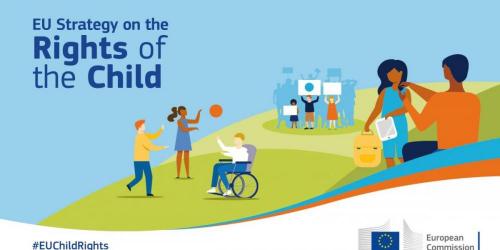
https://eeas.europa.eu/headquarters/headquarters-homepage/107516/young-p...
The EU Strategy on the Rights of the Child was developed with contributions from over 10,000 children and proposes new actions to address challenges related to the support of children, and the protection and promotion of their rights both inside the EU and globally. The first ever Youth Action Plan in EU external action will be further complemented by an updated Better Internet for Children Strategy in 2022 to ensure that children enjoy the same rights online as offline.
Millions of children in the EU live in risk of poverty or social exclusion, with negative consequences for their learning, well-being, and development. The new European Child Guarantee aims to break this cycle and promote equal opportunities.
As the global coronavirus pandemic rages for a second year, children around the world remain amongst the most heavily impacted in their well-being by the continued limitations to schooling, with most countries affected by school closures. With an estimated 466 million children with no access to remote learning, many have dropped out of school for good.
The EU supports education in approximately 100 countries worldwide, and has been working with partner countries since the beginning of the crisis to minimise the impact of the pandemic on learning and the well-being of children, and to facilitate a safe return to school. Joint efforts and actions have resulted in the development of COVID-19 Response Plans and, where possible, to adapt education cooperation programmes to help governments ensure delivery of education services, distance learning, curriculum adaptation and support to teachers.
Every child across the world should enjoy the same rights and live free from discrimination and intimidation of any kind. We strive to “leave no child behind”, using every possible means to reach out to most vulnerable children in line with our ambitions under the 2030 Agenda for Sustainable Development.
Combating violence against children and ensuring child protection is a significant pillar within the external actions. The EU continues to address violence against women and girls through the EU-UN Spotlight Initiative and through funding of civil society organisations for strengthening child protection mechanisms, particularly in the wake of the devastating effects of the pandemic. The EU has committed to continue allocating 10% of humanitarian aid funding for education in emergencies and protracted crises, and promote the endorsement of the Safe Schools Declaration.
The protection of children in armed conflict remains a central concern to the EU. In accordance with the Strategy on the Rights of the Child, the EU is committed to intensify the efforts needed to prevent and end grave violations against children affected by armed conflict.
Every child deserves a peaceful and secure childhood and the chance to go to school. This is still being denied to around 160 million children around the world who are engaged in child labour, with 79 million children trapped in hazardous work. After falling for 20 years, we see for the first time again an increase in the number of children affected in 2020 and thus robbed of their childhood.
2021 was designated the International Year for the Elimination of Child Labour, a time to re-double collective efforts to end child labour for good… However, COVID-19 put a lot of pressure on education, as temporary school closures affected more than 1 billion children in over 130 countries. We also saw a rise in poverty in many countries, hence reduced incomes and school closure led to an increase in child labour.
The EU Strategy focuses on working towards target date of 2025 for the full elimination of child labour worldwide, and announced a zero tolerance approach against it. To this end, EU trade policy, through its free trade agreements and General Scheme of Preferences, also contributes to the fight against child labour, by requiring trading partners to effectively implement the ILO conventions on the worst forms of child labour and on minimum age.
"We must invest in the present and future of all children. It is our responsibility and we will leave no child behind.”
- EU Statement, World Children’s Day
---
On 20 November, kids will reimagine a better world
From children taking over high-visibility roles to famous landmarks turning blue, check out this initiative by UNICEF for a taste of what to expect on the day.
What will you do to turn the world blue?
'My rights, my voice' - video contest:
The EU Delegation to the Council of Europe and the Permanent Representations of Andorra and San Marino, announced the winners of their joint video contest 'My rights, my voice', consisting of artistic video projects from children and young people aged 10 to 17, reflecting children’s understanding of their own rights. The five winning videos on the rights of the child were screened at the Palais de l’Europe in Strasbourg on 10th November 2021, in the context of the European Day on the Protection of Children against Sexual Exploitation and Sexual Abuse and the World Children's Day.
See Also










Add new comment